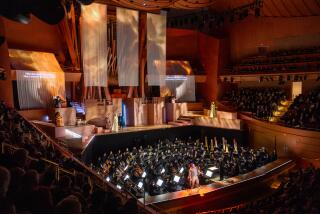‘La Bohème’ comes to Southern California — twice
The perfect “first opera” for a newcomer to the art form? Puccini’s “La Bohème,” of course.
It is funny, it is sad. It is directly emotive, it is highly sophisticated. It is full of good tunes and doesn’t go on too long. “La Bohème” appeals to young people who see themselves in the characters and to older audiences for whom it calls back the shadows of soirees past. We recognize its heroes and heroines: Didn’t we just see poet Rodolfo in a Silver Lake cafe? Or philosopher Colline, buried in the stacks of the library? And might that have been lost, ailing Mimi we passed the other evening on Hollywood Boulevard?
Indeed, I can’t think of any other opera that so convincingly bewails the horrors of poverty while making most of the resulting hardships seem so deeply romantic. Cold weather permeates “La Bohème” — it begins on a frozen Christmas Eve in the garrets of Paris — and yet the impression we take away with us is that of a suffusion of human warmth. It is a world in microcosm, pulsing, youthful, meticulously detailed and deeply believable — flesh and blood behaving as flesh and blood always have and always will.
“La Bohème” is never far away — it is invariably near the top of Opera America’s list of the five most performed works in any given year — but Southern California will serve as the host for two productions over the next few weeks. On Thursday, Pacific Symphony will offer the first of three semi-staged performances at the Renée and Henry Segerstrom Concert Hall. Carl St.Clair will conduct, and the cast will include Maija Kovalevska as Mimi, David Lomeli as Rodolfo, Hyung Yun as Marcello, George Jarman as Musetta and Denis Sedov as Colline.
And then, beginning May 12 and running for six performances, Los Angeles Opera will revive its celebrated 1993 production by the late filmmaker Herbert Ross. Conductor Patrick Summers will make his company debut with the husband and wife team of Stephen Costello and Ailyn Pérez as Rodolfo and Mimi, Artur Rucinski as Marcello, Robert Pomakov as Colline and two sopranos as Musetta, Valentina Fleer and Janai Brugger.
The story was taken from “Scenes de la Vie de Bohème” (“Scenes From Bohemian Life”) a set of mostly lighthearted sketches published in 1851 by the Parisian author Henri Murger. Ruggero Leoncavallo, best remembered as the composer of “I Pagliacci,” was also working on a setting of “La Bohème”; he claimed that Puccini had stolen the idea from him and publicly denounced his former friend in a statement to the newspapers in 1893. Puccini replied with a less than fully convincing denial. “What does this matter to him?” he asked. “Let him compose and I will compose. The public will judge.”
Puccini was the faster worker, and his “La Bohème” received its world premiere in Turin, Italy, on Feb. 1, 1896: the young Arturo Toscanini was the conductor. It was an immediate hit; Buenos Aires presented the opera that June, and there were productions in Egypt, Russia, Germany, Portugal and England the following year and in New York and Paris in 1898. After that, the opera settled in for good: the arias, duets and the great quartet were recorded and re-recorded; eventually there were more than 100 commercial recordings.
Lillian Gish and John Gilbert started in a silent film of “La Bohème” (1926), directed by King Vidor. Herbert von Karajan and Franco Zeffirelli presided over the first complete film of the opera in 1965, with the young Mirella Freni as a fetching Mimi. There are now dozens of telecasts of the films available for download or on DVD.
And then there was “Rent” (1996) — conceived by the late Jonathan Larson as a musical inspired by “La Bohème” and described by its playwright Bill Aronson as a work “in which the luscious splendor of Puccini’s world would be replaced with the coarseness and noise of modern New York.”
Of course, there was more than a little “coarseness and noise” in Puccini’s original. L.A. Opera carries a warning to parents on its website: “This is a coming of age comedy. Contains mild alcohol use and sexual innuendo; parental discretion is advised.”
Both companies will present “La Bohème” with titles, which add immeasurably to one’s immediate comprehension and enjoyment of the work. Watching an opera without titles now seems as strange as watching a Bergman film and listening only to the original Swedish.
A funny thing happened during a performance of “La Bohème” by the Washington Opera in the late 1990s. A battery-powered computer was producing the titles and in the final act, the desperately sick Mimi lay shivering in her attic, begging her Rodolfo not to leave her. Rodolfo reassures her, of course, but his response was represented in bright red and bore an alarming message: “Your battery is running low and your screen has been dimmed!”
Leoncavallo finished his “La Bohème,” by the way. It received its world premiere in Venice on May 6, 1897, some 15 months after Puccini’s version. It has been recorded and is staged on rare occasions. But it was too late. As Puccini predicted, the public had rendered its judgment.
‘La Bohème’
Where: Pacific Symphony, Renée and Henry Segerstrom Concert Hall, Costa Mesa
When: 8 p.m. Thursday, Saturday and April 24.
Tickets: $30-$110
Information: (714) 755-5799 or https://www.pacificsymphony.org
Where: Los Angeles Opera, Dorothy Chandler Pavilion, downtown L.A.
When: May 12-June 2
Tickets: $20-$230
Information: (213) 972-8001 or https://www.laopera.com
Page is a professor of music and journalism at the University of Southern California. He won the Pulitzer Prize for criticism in 1997 while with the Washington Post.
More to Read
The biggest entertainment stories
Get our big stories about Hollywood, film, television, music, arts, culture and more right in your inbox as soon as they publish.
You may occasionally receive promotional content from the Los Angeles Times.






